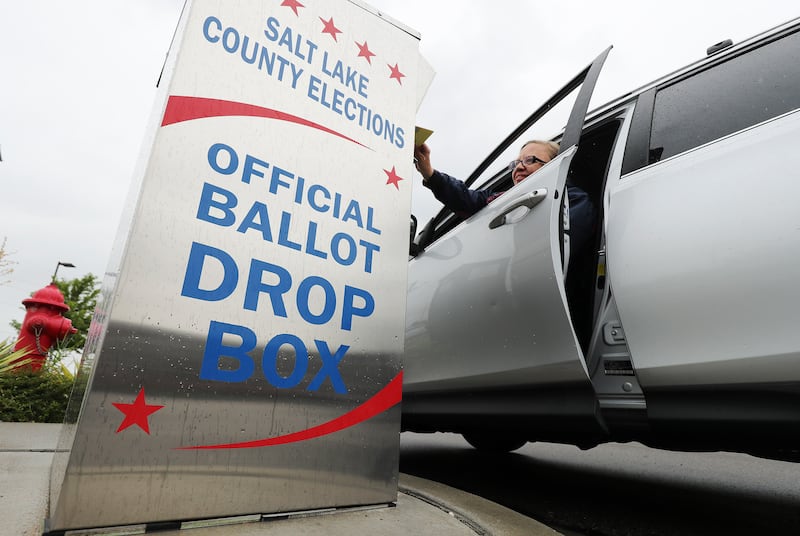On Tuesday, county clerks across Utah began mailing ballots for the state’s June 28 primary elections.
All but one of Utah’s delegation faces a primary challenge this year — freshman Sen. Mitt Romney, who is halfway through his six-year Senate term. A number of state lawmakers, school board members and county officials also have challengers within their own party.
The Republican primaries for U.S. Senate and House are of particular importance, as they often determine the overall winner in deep red Utah.
With the exception of Utah’s 4th Congressional District, where Democrat Ben McAdams served one term before he was narrowly ousted by Republican Burgess Owens in 2020, the GOP has enjoyed a tight grip on Utah’s Senate and House seats for decades. Jim Matheson, who also represented the 4th Congressional District, is the only other Democrat to represent Utah in Washington, D.C., in the last 20 years.
From how to register if you’re an unaffiliated voter, to the Deseret News’ coverage of the debates, here are five things to know ahead of the upcoming GOP primaries.
The basics
On Tuesday, every registered voter in Utah was mailed a ballot. That doesn’t mean every registered voter will receive a ballot, as changes in addresses or party affiliation could impact when and where yours is mailed.
There are several ways to vote — by mail, ballot drop boxes, early voting locations and polling locations on Election Day.
Here are some important dates to consider:
- March 31: The last day to change party affiliation if you are registered Republican, Democrat, Libertarian or one of Utah’s many other political parties.
- June 7: Ballots are mailed to registered voters.
- June 17: The last day to register to vote by mail and for unaffiliated voters to register with a party. Voters can still register in person at early voting locations or on Election Day.
- June 21: The last day to request a mail-in ballot.
- June 24: The day many county clerks, including Salt Lake’s, recommend you put your ballot in the mail.
- June 27: Ballots sent via mail need to be postmarked on this day.
- June 28: Election Day.
- July 11: The day before the board of canvassers meets to certify the election, and the last day a voter with a discrepancy in their ballot — like a missing signature — can submit their cure letter to fix the error.
Sherrie Swensen, Salt Lake County clerk of 32 years, says every election there are a few things that get in the way of Utahns successfully submitting their ballots.
- Update your address with the county clerk: It’s important that anyone who moved notifies their county clerk so they can receive the correct ballot. When someone moves, they often have different representation at their new address — in some Utah towns, like Millcreek, just moving across the street could land you in a new congressional district. Ballots cannot be forwarded to a new address because they would have the incorrect candidates for that district.
“We want people to let us know if they’ve moved so we can update their address. We will spoil the ballot we’ve already mailed, so if anyone else turns it in, it would be invalid,” said Swensen. “We would then generate a new ballot to their new address.”
- Postmark your ballot the day before Election Day: Every year there are hundreds of ballots deemed invalid in Salt Lake County because they are postmarked too late. “That always makes me very sad,” said Swensen. If you miss that deadline, you can always stop by one of the state’s many ballot drop boxes before 8 p.m. on June 28.
- Sign the return ballot envelope: Voters sometimes forget to sign the affidavit, a critical identifier needed to count their vote. For those who forget, the county will send out a cure letter to notify the voter that their ballot has not been counted — Salt Lake County, and other counties, will also call and email voters. “If I could put a neon sign on the affidavit envelope, I would,” said Swensen.
What to know if you are an unaffiliated voter
Unaffiliated voters are a massive part of the Utah electorate. Consider this:
- As of Monday, there are 477,658 active unaffiliated voters in Utah — 190,097 of them in Salt Lake County.
- There are 874,114 active registered Republicans — 238,093 in Salt Lake County.
- There are 234,104 active registered Democrats — 127,300 in Salt Lake County.
Unaffiliated does not mean independent, though the two terms are often used interchangeably. It simply means you are registered to vote, but not with a particular party.
If you are unsure which party you are registered with, if any, you can check your status on the state’s website.
The GOP primary is closed, meaning only registered Republicans can vote — unaffiliated voters, however, have until June 17 to register as a Republican. If they miss that deadline, they can register and vote in person.
In Salt Lake County, all unaffiliated voters received a ballot preference letter letting them know they have an option to request a ballot.
What to know if you are registered with a party
Because the Utah GOP holds closed primaries, it’s too late to vote for any Republicans this June if you’re already registered with another party.
In 2021, Rep. Jordan Teuscher, R-South Jordan, sponsored HB197 to cut down on so-called party raiding, where Democrats register as Republicans, or vice versa, to vote against certain candidates. Instead of June 17, the deadline to switch parties is now March 31.
All Republicans will be automatically mailed a Republican ballot. State level Democratic primaries are open, so an unaffiliated voter or registered Republican can still vote for candidates in those elections if they request a ballot.
New districts
There are some Utahns who, despite their representative for the last several years running for reelection, might see some unfamiliar names on their GOP ballot this year.
That’s because of new maps drawn by the Utah Legislature in 2021 that slice Salt Lake City into four congressional districts. The 2nd, 3rd and 4th districts used to converge east of the city in the Wasatch Mountains — now, all four districts meet in Millcreek.
The 1st Congressional District now encompasses parts of eastern Salt Lake City that used to be in the 2nd District, while the 4th District creeped further north into Salt Lake County, and south into Sanpete County.
Updated maps are available here. You can compare those districts with the maps used from 2012-22 here. The state’s election portal also has personalized information regarding the new districts and ballots.
The new maps are not without controversy — advocates say lawmakers are guilty of gerrymandering, and have filed a lawsuit.
Who is on the ballot?
Perhaps the most high-profile race this year is for one of Utah’s two Senate seats, held by Republican Sen. Mike Lee since 2010.
Lee faces two primary challengers — former Republican state lawmaker Becky Edwards and Ally Isom, a longtime communications, public policy and political strategist. Utah has never elected a woman to the U.S. Senate.
The three candidates took the debate stage once, answering questions drafted by the Utah Republican Party. However Lee, like all but one of his Utah colleagues in the House and Senate facing reelection, declined to participate in the debate hosted by the Utah Debate Commission.
The GOP nominee in the Senate race will not face off against a Democrat in the general election. Instead, the Utah Democratic Party threw its support behind independent Evan McMullin, a former CIA agent who received 22% of Utah’s vote during the 2016 presidential election.
1st Congressional District
Freshman Rep. Blake Moore has two opponents in June’s election: Tina Cannon, a former Morgan County Council member and Andrew Badger, a former intelligence officer for the U.S. Defense Intelligence Agency.
Both Moore and Cannon qualified for the primary through signature gathering, while Badger gained enough support during the Republican Convention to make his way on the ballot.
Moore was the only member of the Utah Delegation to participate in a Utah Debate Commission event, a fiery debate where he repeatedly defended his record against claims that he hasn’t pushed back enough on President Joe Biden’s agenda.
2nd Congressional District
Elected in 2012, Rep. Chris Stewart is chasing his sixth term in the House — but for the first time in his congressional career, he faces a primary challenge in Erin Rider, a Salt Lake City attorney.
Though she only received 15% of the vote during the Republican state convention, Rider gathered signatures ahead of time to earn a spot on the primary ballot.
Stewart also declined a Utah Debate Commission invite. However, he and Rider sat down in a GOP-sponsored debate where they were largely on the same page regarding gun control, inflation, immigration and policies pushed by the Biden administration.
3rd Congressional District
Utah Rep. John Curtis has been in Congress for over four years. In that time, he’s defeated Chris Herrod twice — this June will mark the fourth attempt by the Provo-based real estate developer and former state lawmaker, who beat Curtis in a Utah House race years ago.
Curtis defeated Herrod in a three-person special election in 2017 and in a primary in 2018. Curtis didn’t have a primary in 2020.
The two met in a GOP-sponsored debate on the BYU campus, where they tackled issues including education reform, Big Tech, Roe vs. Wade, immigration and the Second Amendment in the wake of the mass shooting that killed 19 students and two teachers in Uvalde, Texas.
4th Congressional District
Rep. Burgess Owens enters his second primary after narrowly beating Democrat Ben McAdams by just over 3,500 votes in 2020.
Owens was the preferred nominee during the GOP convention, winning over 68% of the vote — but his opponent, Jake Hunsaker, collected enough signatures to face the former NFL player and frequent Fox News host in the primary.
Hunsaker, who works in business analytics and operations management, never got his chance to debate Owens, who declined to participate in debates sponsored by both the Utah Debate Commission and the Utah Republican Party.


 alt=Kyle Dunphey
alt=Kyle Dunphey